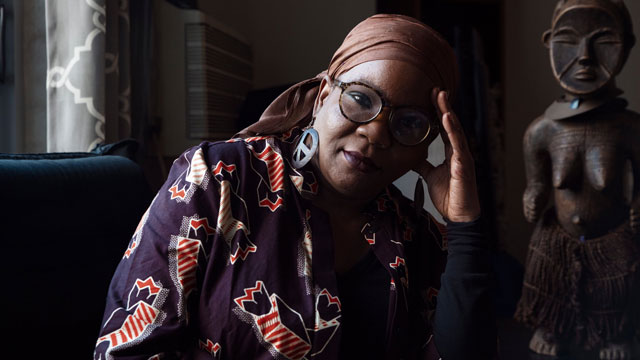Mariame Kaba’s keynote address commemorating Martin Luther King Jr. comes as Northwestern — and the country — continue to grapple with issues of race, policing and social justice. Her livestreamed address was attended by more than 1,200 people on Wednesday, Jan. 13.
Kaba, an organizer, educator, curator and prison industrial complex (PIC) abolitionist, is active in movements for racial, gender and transformative justice. She is founder and director of Project NIA, a grassroots organization with a mission to end youth incarceration, and a member of the Movement for Black Lives Policy Table.
In her keynote, Kaba discussed prison industrial complex abolition as a vision for a restructured society based on care, cooperation and true safety. She argued that if King were alive today, as someone who was arrested and jailed 29 times in his lifetime, he too would be addressing the prison industrial complex.
King described solitary confinement as a form of torture, said Kaba, writing “You will never know the meaning of utter darkness until you have lain in such a dungeon, knowing the sunlight is streaming overhead and still seeing only darkness below.”
In his famous “I Have a Dream” speech, King said in one of his less often quoted passages, “We can never be satisfied as long as the Negro is the victim of the unspeakable horrors of police brutality.”
“The truth is that the Dream speech was as much about the nightmares inflicted on Black people as about the aspirational goal of black freedom,” Kaba said.
Weighing in on the campus activism around policing, Kaba said: “Real community safety is not created by increasing criminalization. Different harms need different responses.”
Kaba was selected with this year’s One Book, One Northwestern selection, Bryan Stevenson’s “Just Mercy,” in mind as well as the Women’s Center’s programmatic theme of Mutual Aid and Community Engagement.
Kaba discussed the issue of mutual aid — cooperation for the sake of the common good — in historical terms, using the Montgomery Bus Boycotts, and in present terms, COVID-19 as examples.
She recalled a story about King and the civil rights activists involved in the bus boycotts, considered the first large-scale U.S. demonstration against segregation, organizing ride pools and food and bake sales to fund the boycott, an example of mutual aid.
She pointed to large-scale examples of mutual aid in the U.S. today — community members organizing childcare and PPE for frontline workers during the pandemic, as well as coordinating fundraisers for those out of work. She also pointed to volunteers distributing food and water to anti-racism protestors during the summer as another example of mutual aid.
“Mutual aid marries community service with activism and education,” Kaba said. Referencing the book “Mutual Aid: Building Solidarity During this Crisis (and the next)” by law professor and activist Dean Spade, she added that it empowers communities to meet their own material needs, while at the same time exposes failures in our current system.
During a Q&A session moderated by students Karina Karbo-Wright ’22 and Godson Osele ’21, Kaba, who taught and studied sociology as a student at Northwestern, was asked what the first steps in organizing should be.
“Start where you are,” Kaba said. “Find the people you can work with around you. Don’t try to be a lone ranger.” She also stressed the importance of studying and learning about an issue.
For those interested in working alongside those who are incarcerated, she offered “Nine Solidarity Commitments to/with Incarcerated People for 2021,” including:
- Learn some basics about incarceration and criminalization
- Write at least six letters to an incarcerated person in 2021
- Make at least four donations (of any amount) to incarcerated peoples’ commissary accounts in 2021
Kaba commended the work of student-activists, who in the fall, led nightly protests on campus and in Evanston and have advocated for change.
In June, University officials committed to 10 social justice initiatives, and have begun a series of discussions on issues of diversity, equity and inclusion with members of the Northwestern community. Earlier this month, the University launched a Social Justice at Northwestern website to track progress.
“Mariame is such a thoughtful and talented teacher,” said Melisa Stephen, program coordinator of the Women’s Center at Northwestern and Dream Week 2021 committee member. “She has a remarkable gift of simultaneously humbling you to the challenging, sometimes ugly truths of human nature and inspiring you to dream bigger than you ever thought you could. Her voice and work are an invaluable source of guidance in a time of heightened awareness and reckoning."
The Northwestern Community Ensemble opened the keynote program with a video performance of “Lift Every Voice and Sing,” featuring current members and alumni in celebration of the 50th anniversary of the ensemble’s founding.
Kaba’s address kicked off Northwestern’s MLK 2021 Dream Week organized by the Office of Institutional Diversity and Inclusion. Next week’s events include:
- Eva Jefferson Day, 9 a.m. to 3 p.m., Monday, Jan. 18: Northwestern students will lead a virtual program of arts, crafts and discussion about the legacy of Dr. King for Family Focus Evanston students.
- Candlelight Vigil: “Activism during a pandemic and the healing of incarcerated peoples,” 3 p.m., Monday, Jan. 18, keynote address by Hill Harper, an actor, author, activist, philanthropist and Brother of Alpha Phi Alpha Fraternity, Inc.
The livestream link for the candlelight vigil and other MLK programs on the Evanston and Chicago campuses — including a captioned archive video of Kaba’s address — can be found on Northwestern’s MLK website.


